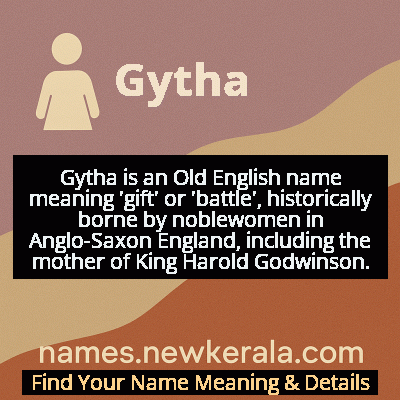Gytha Name Meaning & Details
Origin, Popularity, Numerology Analysis & Name Meaning of Gytha
Discover the origin, meaning, and cultural significance of the name GYTHA. Delve into its historical roots and explore the lasting impact it has had on communities and traditions.
Name
Gytha
Gender
Female
Origin
Christian
Lucky Number
7
Meaning of the Name - Gytha
Gytha is an Old English name meaning 'gift' or 'battle', historically borne by noblewomen in Anglo-Saxon England, including the mother of King Harold Godwinson.
Gytha - Complete Numerology Analysis
Your Numerology Number
Based on Pythagorean Numerology System
Ruling Planet
Neptune (Ketu)
Positive Nature
Intuitive, analytical, spiritual, and inquisitive.
Negative Traits
Secretive, reserved, aloof, and can be overly critical.
Lucky Colours
Green, yellow.
Lucky Days
Monday.
Lucky Stones
Cat’s eye, moonstone.
Harmony Numbers
1, 5, 6.
Best Suited Professions
Scientists, researchers, spiritual leaders, detectives.
What People Like About You
Depth of knowledge, analytical skills, spirituality.
Famous People Named Gytha
Gytha Thorkelsdóttir
Noblewoman
Matriarch of the Godwin family, mother of the last Anglo-Saxon king of England
Gytha of Wessex
Princess
Became ancestor of Russian royalty through marriage to Vladimir Monomakh
Gytha of Haldersleben
Countess
Mother of Albert the Bear, founder of the Margraviate of Brandenburg
Name Variations & International Equivalents
Click on blue names to explore their detailed meanings. Gray names with will be available soon.
Cultural & Historical Significance
The name's Christian significance stems from its meaning 'gift,' which resonated with medieval Christian nobility who saw children as divine blessings. During the Norman Conquest and subsequent centuries, the name persisted in aristocratic circles as a symbol of legitimate lineage and cultural continuity. The various Gythas in medieval records often appear as key figures in diplomatic marriages that strengthened alliances between Scandinavian, English, and continental European powers. This historical role makes the name a living connection to the complex cultural fusion that shaped modern European identities.
Extended Personality Analysis
Individuals named Gytha typically exhibit a unique blend of strength and compassion that reflects their name's noble heritage. They often possess a quiet authority that commands respect without being domineering, combined with deep emotional intelligence that allows them to understand and support others effectively. Gythas are frequently described as 'pillars of strength' in their families and communities—reliable, practical, and gifted at maintaining harmony during challenging times. Their historical namesakes were women who navigated political turmoil and cultural change, and modern Gythas often inherit this adaptability and resilience.
These women tend to value tradition and family history while being forward-thinking and open to new ideas. They often serve as keepers of family stories and cultural traditions, understanding the importance of preserving heritage while allowing for growth and change. Gythas typically approach life with a combination of pragmatism and intuition, making them excellent problem-solvers who consider both practical realities and human emotions. Their 'gift' often manifests as an ability to bring out the best in others and create environments where people feel valued and understood. This balanced approach to leadership and relationships makes them particularly effective in roles that require both strength and sensitivity.
Modern Usage & Popularity
In contemporary naming practices, Gytha occupies a unique niche as a historically significant but rarely used name. It appeals particularly to parents interested in medieval history, Scandinavian heritage, or seeking distinctive names with deep roots. While the name doesn't appear in modern popularity charts, it maintains a steady presence in historical societies, reenactment communities, and among families with specific cultural connections. The 21st century has seen a slight increase in usage as part of the broader trend toward vintage and heritage names, though it remains well outside the mainstream. Modern Gythas often appreciate their name's distinctiveness and the conversation it sparks about history and identity. Some choose to use the more accessible variant 'Githa' professionally or socially while retaining the full name for formal contexts. The name's rarity ensures that those who bear it stand out, while its historical gravitas provides a sense of connection to a rich cultural legacy.
Symbolic & Spiritual Meanings
Symbolically, Gytha represents the enduring power of cultural memory and the gifts that come from embracing one's heritage. The name embodies the concept of inheritance in its broadest sense—not just material possessions, but cultural traditions, family stories, and historical consciousness. As 'gift,' it symbolizes the unexpected blessings that come from embracing one's roots and the value of what is passed down through generations. Metaphorically, Gytha represents cultural bridges and the synthesis of different traditions, reflecting the historical reality of Norse and English integration.
The name also carries connotations of matriarchal wisdom and the quiet strength that shapes history from behind the scenes. Unlike more overtly powerful names, Gytha symbolizes influence through connection, relationship-building, and cultural preservation. It represents the idea that true power often lies in maintaining continuity and nurturing growth rather than in conquest or domination. In a modern context, the name serves as a reminder of the importance of cultural roots in an increasingly globalized world, symbolizing the value of knowing where we come from while moving forward with purpose and identity intact.

